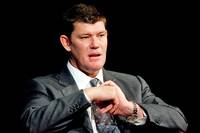Australian casino mogul James Packer took a bath on the Fontainebleau, sinking hundreds of millions of dollars into the doomed Las Vegas resort that now sits blighted and unfinished.
But that didn’t turn him off from the north Strip — especially when there’s a bargain to be had.
Packer, the billionaire chairman of Crown Resorts, has teamed with former Wynn Resorts executive Andrew Pascal and investment giant Oaktree Capital Management to acquire a controlling stake in the vacant 34.6-acre former New Frontier site, just north of Fashion Show mall, with plans to build a resort there.
Terms of the sale were not disclosed, but Packer’s group reportedly paid $280 million — a fraction of the $1.24 billion that Israel’s El-Ad Group paid for the property in 2007, at the peak of the real estate bubble.
Details of the new resort also were not announced. Executives said plans are being finalized, but the group expects to start construction in late 2015 and finish in 2018.
Like any Strip resort, the project will boost Las Vegas’ economy with hundreds, if not thousands, of construction, hotel and casino jobs.
And the sale, despite its huge discount from the boom years, marks an uptick in Strip property values and yet another big investment in the struggling north Strip, poised for a revival with the SLS Las Vegas set to open Aug. 23 and a Chinese-themed megaresort in the works.
Analysts dismissed concerns that the project would oversaturate the resort corridor with hotel rooms, saying occupancy and room rates are climbing and tourism levels are strong, even though visitors increasingly ignore the Strip’s traditional cash cow — casino floors — for shopping malls and nightclubs.
Through June, almost 21 million people had visited Las Vegas this year, up 4 percent from the same period last year, according to the Las Vegas Convention and Visitors Authority.
Strip hotels have a 90 percent occupancy rate this year, up from almost 88 percent a year earlier, and the average daily room rate is $130.61, up 7 percent, the LVCVA says.
The Packer sale amounts to an estimated $15 million to $16 million an acre, as the group took outright ownership of roughly half the site and is renting the rest, said Bill Lerner, a principal of Union Gaming Group, an advisory and research firm.
That’s a far cry from El-Ad’s purchase but a boost from the $4 million an acre that Malaysia-based Genting Group paid last year for the mothballed Echelon site, where it plans to build the Chinese-themed Resorts World Las Vegas in phases over the next two to three years.
“It creates a new benchmark,” Lerner said.
The deal also is a “reverse investment” in which a company with Asian casinos does a deal in Las Vegas, bucking the trend of local titans such as Steve Wynn and Sheldon Adelson hunting for growth in Macau and elsewhere in Asia, said John Restrepo, principal of RCG Economics.
As Restrepo sees it, Packer’s group would have to build a high-end resort to recoup its land investment, to lure Asian high-rollers and to compete with nearby luxury properties.
But whether Packer’s project increases tourism or just poaches visitors from other hotels depends on how unique its resort is.
“It’s all going to depend on the quality of the product they put up,” Restrepo said.
However, his project partner, Pascal, spent decades working for Steve Wynn and was deeply involved in the mogul’s resort projects, said Mike Mixer, executive managing director of real estate brokerage Colliers International’s local office.
“He’s had one of the masters showing him the ropes for a long time,” Mixer said. “He’s ready.”
Packer’s Crown Resorts operates casinos in Australia, London and Macau. Before the recession, the company invested about $792 million (Australian) for a 20 percent stake in the Fontainebleau, and made smaller investments in other Las Vegas casino operators, according to Bloomberg News. By 2009, though, the value of those investments had been wiped out.
El-Ad, meanwhile, bought the New Frontier from casino mogul Phil Ruffin and tore it down. The company had planned to replace the old Vegas haunt with an $8 billion luxury hotel similar to its Plaza Hotel in New York, but the recession quashed the project.

